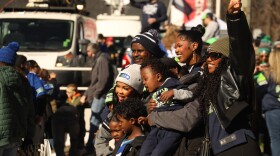At the Granite Curling Club in Seattle’s Haller Lake neighborhood, competition and camaraderie go hand in hand.
Jazz Fox-Canning, an events instructor at Granite, describes curling as “a little bit like bowling, a little bit like shuffleboard, a little bit like darts.”
In a standard curling game, four-player teams take turns sliding granite stones down sheets of ice toward bullseye-shaped targets. Using special brooms, players scrub at the ice to change the moving stone’s direction and speed. The goal is to finish with your stone closest to the center of the target, or “house.”
Phil Shryock, a former Granite president who currently serves on USA Curling’s board of directors, freely acknowledges how strange the sport can seem to outsiders.
“If you are a curler, you are not in a position to judge anybody else’s hobbies as being too weird,” he said. “Because we kind of win that game.”
Many Americans have never heard of curling, nor seen the game played. But Canadian curling enthusiasm trickled down to some northern states, including Washington. For decades, the Granite Curling Club has been the epicenter of curling in the northwest United States.
While more clubs have sprung up in recent years, Granite is still the largest in the region—boasting five sheets of ice and about 600 members. It offers seasonal leagues, Learn to Curl events, and programs for junior and adaptive curlers. It also hosts six to seven tournaments, or bonspiels, a year.
Most recently, Granite hosted its annual Summer Spiel, which drew curlers from as far away as Plainfield, New Jersey. Locals also flocked to the relaxed weekend event. Granite member Cyndi Parrish, who formed a bonspiel team with her husband and two curling newbies, cheerfully encouraged her inexperienced teammates.
“It looks so natural when people do it on TV,” Parrish said, recalling her first time on the ice. “It looks so smooth. And then you try it and you’re like, ‘What am I even doing with my body?’”
As Parrish glided across the ice, she was hindered by her giant graham cracker costume. Surprisingly, the goofy outfit didn’t stand out in the crowd. Dressing up and having fun is all part of the universal “spirit of curling,” according to Granite secretary Todd Schultz.
“You’re competitive as heck on the ice, but once you’re done, you’re shaking hands, you’re laughing, you’re having a good time,” Schultz said.
In fact, the winners of a curling game are expected to buy the losers drinks, which they can do at the built-in bar in Granite’s upstairs “warm room.”
Despite the casual atmosphere and free-flowing alcohol, there’s no doubt that Granite curlers take their sport seriously. The club boasts the most national champion curlers in the United States, and has sent multiple members all the way to the Olympics.
Still, Granite’s champions often mingle with newbies at events like the Summer Spiel. And it’s clear that what keeps so many people returning to the club isn’t curling—it’s community.
“It is a space that some people call the third place,” said Lori Markham, a Granite board member. “Some people call it their church community. We are essentially a big, dysfunctional family.”
Now that the Summer Spiel has wrapped up, Markham and her curling family are taking their summer hiatus. But come fall, they'll return in advance of Granite's 75th season on the ice.











